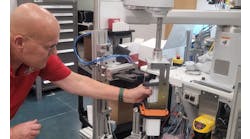Forget waiting for next-generation engineers. Digitalization, IIoT and other technologies are changing so fast that current process industry personnel must get retrained now.
In this series, we explore the widening skills gap, avoid brain drain and deal with the compounding challenges posed by these new technologies.
Check back every day this week for another installment in this series.
Day 1: Close the skills gap
Many potential operators and technicians—both young and old—are also looking to gain new skills, and get hired by process industry companies with better pay and chances to advance than in their present or former jobs. These individuals are doing so through programs like Joliet Junior College's Process Controls and Instrumentation Technology (PCIT), as well as those organizations are producing themselves. Read more.
Digitalization, IIoT demand current process industry personnel be retrained
In this feature-length article, executive editor Jim Montague explores the challenges and opportunities in process automation and control workforce development. Although the skills gap and brain drain are among the challenges organization's face, digitalization and the Industrial Internet of Things (IIoT) have thrown a wrench into things, and require current employees, young and old, to be continuously training. Read more.
Day 2: Employers must sell jobs, selves
To attract and retain millennial-age engineers and operators, many employers acknowledge they must adjust their traditional strategies and requirements. Here's how some companies are working to attract and maintain their new, younger workers. Read more.
Resource guide: Developing the workforce
Control's monthly resource guide brings you invaluable industry information to help you stay up-to-date on the latest trends and developments. This month's guide focuses on workforce development resources. Read more.
Day 3: Can data take a shift?
Given recent advances in data acquisition and analytics, some users and developers are investigating whether better, closer-at-hand information can patch some of the know-how and experience gaps created as veterans are replaced by rookies. Here's how some are using new data streams and technologies to engage new workers. Read more.
How ISA Will-DuPage, local junior college are working together to educate future engineers
ControlGlobal.com digital engagement manager Amanda Del Buono interviews David Riojas, president of the PCIT advisory board and past president of the ISA Will-DuPage chapter; Jeff Bradford, Joliet Junior College (JJC) technical department chair; and Joe Limon, PCIT instructor an associate professor at JJC, about the joint program to educate young process automation technicians. Listen now.
Day 4: Soft skills essential, too
Apart from the technical skills needed in process automation and control, it's also increasingly crucial for engineers and technical professionals to learn the soft skills of interpersonal communications needed for collaboration inside and outside their organizations. Here's the why and how to develop these soft skills. Read more.
Building networks of mentors
Nandita Gupta, process controls engineer at Georgia-Pacific and a 2019 Influential Women in Manufacturing honoree, shares her experience entering the workforce with a mentor, and how she hopes to provide new engineers with a similar or better experience through a formal mentoring program at Georgia Pacific, which is set to launch soon. Learn more.
Day 5: Critical thinking for optimization
Once all the technical, soft and other skills are learned, they can begin to work together, solve problems and optimize processes. This is how experienced engineers, technicians and operators have always solved new problems, and it's still true, even though the Industrial Internet of Things (IIoT) and digitalization have been altering the technological landscape much faster lately. Read more.







